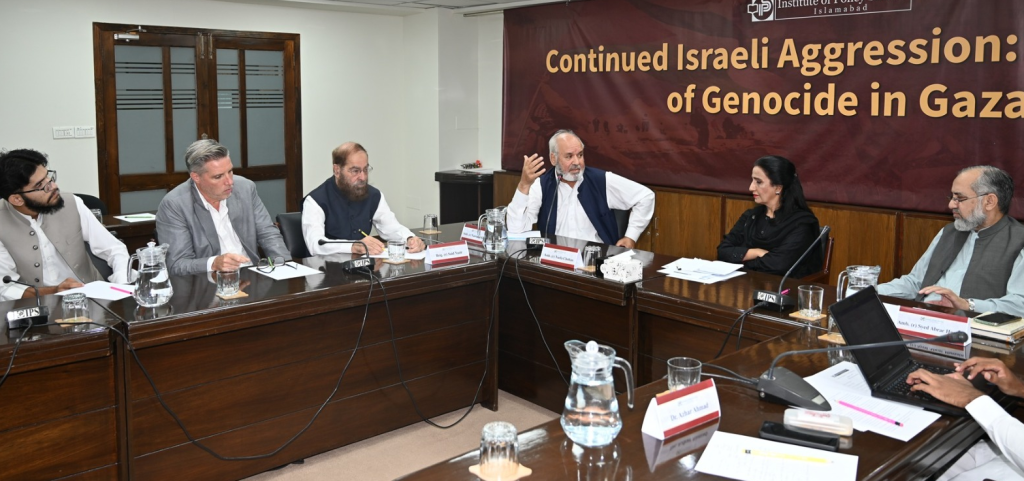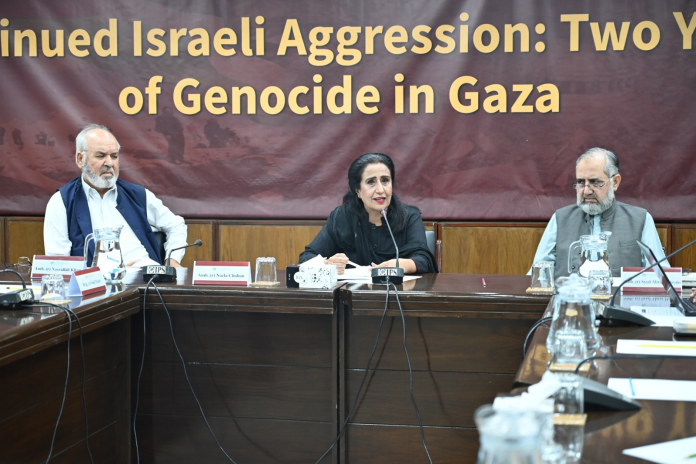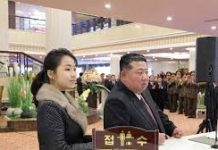ISLAMABAD, SEPT 25 (DNA): Israel’s continued aggression and genocide in Gaza reflect the failure of the international community, compounded by US politics, mostly muted Arab responses, and ineffective global institutions. This underscores the urgent need for Muslim unity, resource pooling, mutual defense arrangements, and peacekeeping forces to stop Israeli actions and expansionist plans and secure regional peace.
Seasoned diplomats, defense analysts, and academics observed this during a seminar titled “Continued Israeli Aggression: Two Years of Genocide in Gaza,” held at the Institute of Policy Studies, Islamabad. It was addressed by Ambassador (r) Naela Chohan as the keynote speaker, Ambassador (r) Nasarullah Khan, defense analyst Brigadier (r) Said Nazir, senior analyst Dr. Azhar Ahmad, and Ambassador (r) Syed Abrar Hussain, vice chairman IPS.
Ambassador Naela Chohan emphasized the importance of accurately framing the Palestine-Israel issue to ensure a holistic understanding. This can help guide the search for a just solution and end the genocide of Palestinians. She further stressed the significance of clarifying whether the conflict is fundamentally religious, political, or commercial. She said that real estate developers view Gaza as land that can be exploited for financial gain, and these commercial interests also drive efforts to expel Palestinians from their homeland.

She observed that the tragedy, once confined to Gaza, has now spread and endangered regional security. The aggression perpetrated by Israel, she added, has led even some of its former sympathizers to call for a ceasefire, though the US consistently blocks such moves. This reflects how the dynamics of internal politics bind American leadership to unconditional support for Israel. She also pointed to Israel’s targeting of the Hamas negotiating team in Qatar as evidence of its unwillingness to pursue peace.
Ambassador Nasarullah said that words cannot express the carnage inflicted by Israel on the Palestinians. Even before the October 7 incident, they were subjected to inhumane treatment, but afterward, the scale of the tragedy increased manifold. He believed this genocide reflects the collective failure of the international community, which has fallen far short of humanity’s expectations.
Building on this, Brig (r) Said Nazir said that the US and Europe continue to support Israel, which disregards every resolution and principle of ethics. Another factor behind Israel’s unchecked aggression, he noted, is the failure of international institutions tasked with ensuring peace and implementing resolutions on Palestine. Similarly, the muted response from most Arab countries has emboldened Israel to persist in its atrocities with impunity.
Said Nazir further stated that after the Israeli attack on Qatar, the US lost its credibility as a security guarantor. Therefore, the way forward lies in Muslim unity and effective preparedness against Israeli actions. A collective defense arrangement, he argued, could serve as a strong bulwark against Israeli aggression by creating a visible and credible deterrent. In this regard, the recently signed Pakistan-Saudi Strategic Mutual Defence Agreement could provide a basic framework for a credible security arrangement. To achieve this, the pooling of military, economic, and technological strengths of Muslim countries would help present a united front against Israel’s hegemonic designs of “Make Israel Great Again (MIGA).”
Dr Azhar Ahmad said that, in addition to addressing Israeli aggression in Gaza, it is necessary to examine the responses of different actors as well. This requires moving beyond merely recounting events to analyzing reactions, the credibility of Israel’s claims, and the practical steps taken by the international community to halt the genocide.
Concluding the session, Ambassador Abrar Hussain said that the Israeli aggression has generated a wave of sympathy for the Palestinian cause, revived discussions on the two-state solution, and prompted many countries to recognize Palestine. However, he stressed that such recognition is insufficient, as ceasefire resolutions continue to be vetoed. Israel, he argued, seeks to expel Palestinians from the entirety of Palestine. As a way forward, he suggested that deploying peacekeeping forces from Muslim countries in Gaza could help secure peace in the region.

















